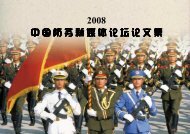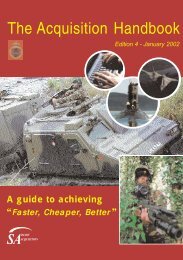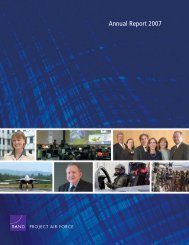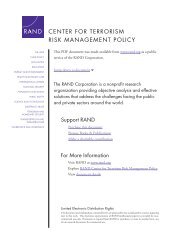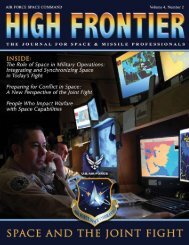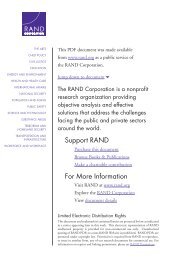How Terrorist Groups End - RAND Corporation
How Terrorist Groups End - RAND Corporation
How Terrorist Groups End - RAND Corporation
Create successful ePaper yourself
Turn your PDF publications into a flip-book with our unique Google optimized e-Paper software.
<strong>End</strong>ing the “War” on Terrorism 127<br />
Intelligence Collection and Analysis<br />
The first is intelligence collection and analysis. Intelligence is the principal<br />
source of information on terrorists. The police and intelligence<br />
agencies have a variety of ways of identifying terrorists, including<br />
signal intelligence (such as monitoring cell-phone calls) and human<br />
intelligence (such as using informants to penetrate cells). Human intelligence<br />
can provide some of the most useful actionable intelligence. But<br />
it requires painstaking work in recruiting informants who are already<br />
in terrorist organizations or placing informants not yet in them.<br />
This means monitoring key individuals within al Qa’ida central,<br />
as well as key hubs in such places as Saudi Arabia, Iraq, Algeria, and<br />
the United Kingdom. The head of the UK security service, MI-5, noted<br />
in late 2007 that his organization identified at least 2,000 individuals<br />
“who we believed posed a direct threat to national security and public<br />
safety, because of their support for terrorism.” Most were al Qa’ida<br />
inspired or assisted. 12 The greatest priority should be extensive penetration<br />
of terrorist networks. Recruitment of agents in place is sometimes<br />
difficult because of the strong emotional bonds among members of<br />
terrorist networks, making them reluctant to betray their friends and<br />
their faith. Local police and intelligence services are often better placed<br />
to recruit informants in al Qa’ida cells. In 2008, MI-5 estimated that<br />
it took roughly 18 months on average for an individual to become radicalized<br />
enough to conduct an attack. That period is fundamental for<br />
police and intelligence services to identify suspects, collect information,<br />
and arrest them. 13<br />
The best avenue for penetration often lies in recruiting from the<br />
pool of those who went through training but decided not to join the<br />
jihad or others who might associate with jihadists in such places as<br />
mosques. In the 2007 plot to target John F. Kennedy International<br />
Airport, for example, New York law-enforcement officials recruited an<br />
informant who attended the same Brooklyn mosque as Russell Defrei-<br />
12 Jonathan Evans, “Address to the Society of Editors by the Director General of the Security<br />
Service, Jonathan Evans,” Society of Editors’ “A Matter of Trust” conference, Radisson<br />
Edwardian Hotel, Manchester, UK, November 5, 2007.<br />
13 Interview with UK intelligence official by Seth G. Jones, January 23, 2008.





